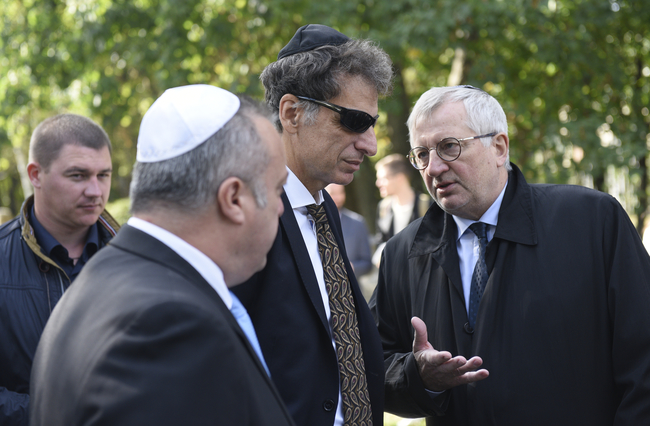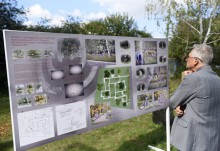A project was presented the other day in Kyiv as part of cooperation between the National Historical Memorial Preserve “Babyn Yar” and the Babi Yar Holocaust Memorial Center – a lapidarium from gravestones of the former Lukianivske Jewish Cemetery. Currently, journalists and guests of Kyiv can see about 70 memorial plates and tombstones (matzevahs) the preserve’s researchers found in Burdock Ravine. All the objects are exhibited along the “Road of Sorrow” from 44, Melnykova St., which housed the former cemetery’s office, to the Menorah commemorative sign.
As Oleksandr Dukhovnyi, Chief Rabbi of Kyiv and Ukraine, explained to The Day, it is one of the roads on which Jews were led to the execution place through the cemetery which, incidentally, the Soviet authorities ruined completely.
In 1962, the Kyiv City Executive Council officially decided to dismantle the cemetery. The wall was taken to pieces and ritual structures were torn down. Some of the gravestones were destroyed and others were scraped off to a branch of Burdock Ravine and later covered with garbage and earth. In 1983, a new television center was built on the Lukianivske Jewish Cemetery’s territory.
Borys Glazunov, Director General, National Historical Memorial Preserve “Babyn Yar,” thus commented to journalists on the importance of establishing the lapidarium: “It is important not only to preserve history, but also to restore what was lost. While our memory of the past is the foundation of historical justice, the establishment of a lapidarium can be called a step towards the building of it.”
Meanwhile, Marek Siwiec, CEO, Babi Yar Holocaust Memorial Center, said in his speech that “we are thus trying to restore justice and honor the memory of the victims of totalitarian regimes.” At the same time, he emphasized the role of this center in drawing up the project of the lapidarium’s further improvement and conceptual development. This project is to be carried out very soon.
On his part, Eliav Belotsercovsky, Ambassador Extraordinary and Plenipotentiary of the State of Israel to Ukraine, believes that it is very symbolic to honor memory by installing Lukianivske Cemetery tombstones.
Against this background, the speech of Yana Barinova, COO, Babi Yar Holocaust Memorial Center, sounded rather peremptory. Reading the text from a piece of paper, she stressed: “The purpose of our memorial is to knit everyone together in the face of the horror of a common tragedy. I am convinced that, for Ukraine, it is the question of the state’s survival and territorial integrity. What happened in Babyn Yar is a tragedy of the entire humankind, our common burden, and, therefore, none of us must forget it. Only by learning this lesson shall we cope with what is going on in the country now.”
Moreover, Ms. Barinova insisted that Ukraine must have as popular a memorial to Holocaust victims as Yad Vashem in Jerusalem.

As Den/The Day has written in many publications before, this clearly shows the Babi Yar Holocaust Memorial Center’s wish to impose its own vision of this memorial without consulting with not only Ukrainian, but also many Jewish organizations. As is known, Mr. Siwiec has said in an interview with the Ukrainian media that the foundation, whose executive board includes the Ukrainian oligarch Viktor Pinchuk and the Russian oligarchs Mikhail Fridman, Gherman Khan, and Pavel Fuks, is planning to build a 100-million-dollar-worth memorial by 2021.
Meanwhile, historians are sounding alarm about this ostensibly international project in Babyn Yar which in fact seems to be spreading the “Russian World’s” ideas. Sixteen historians, including some of Jewish origin, have emphasized that they consider it wrong to attempt to link Babyn Yar with the Holocaust history only, ignoring other victims and other dramatic moments in its history. “This approach will only rekindle the flames of the war of memories, which has been simmering in Babyn Yar for many years,” the letter says (http:// www.istpravda.com.ua /articles/ 2017/ 03/28/149652).
Meanwhile, Volodymyr VIATROVYCH, Chairman, Ukrainian Institute of National Remembrance, stated in Den’s article “Babyn Yar Memorial: a Semi-Closed Format” dated August 2 (https:// day.kyiv.ua/uk/article/den-planety/ memorial-babyn-yar-napivzakry tyy-format) that such projects as Babi Yar Holocaust Memorial should be carried out with participation of the Ukrainian state.
Historian Vitalii Nakhmanovych says in The Day’s article “Babi Yar... as a Staging Area for the ‘Russian World’” dated August 8 (https://day.kyiv.ua/en/article/day-after-day/babi-yar-staging-area-russi...) that the state has in fact bowed out of Babyn Yar problems. He is convinced that “the Ukrainian government as represented by the president of Ukraine must genuinely assume responsibility for solving complex problems around the Holocaust Memorial.”
Anatolii Podolskyi, Candidate of Historical Sciences, head of the Ukrainian Center for Holocaust Studies, leading researcher at the National Academy of Sciences of Ukraine’s Kuras Institute for Political and Ethnic Studies, pointed out in The Day’s article “Babi Yar and the Post-Colonial Approach” dated August 17 (https://day.kyiv.ua/en/article/close/ babi-yar-and-post-colonial-approach) that “there should be a Memorial Park there, for which the Ukrainian state, the Kyiv city authorities, and not some private sponsors should be responsible. And inside this park, we should create the Museum of Babi Yar History.” At the same time, the historian clearly notes that the emergence of such a foundation as Babi Yar Holocaust Memorial Center results from irresponsibility of the authorities of Kyiv and Ukraine as a whole.
On her part, Tetiana PASTUSHENKO, Candidate of Sciences (History), a research associate at the Institute of the History of Ukraine, stresses in Den’s article “Babyn Yar and the Question of National Security” dated August 22 (https://day.kyiv.ua/uk/article/cuspilstvo/babyy-yar-y-vopros-nacyonalnoy...) that the main problem around the Babyn Yar memorial is inaction of the Ukrainian state rather than activity of a foundation with foreign founders, big money, and distinguished foreign politicians and historians in the supervisory board. The state of Ukraine should initiate the establishment of a Holocaust museum and honor the memory of one a half million killed Jews, she argues.
Unfortunately, governmental officials so far give no answers to these questions, particularly, about the state’s vision of the Holocaust memorial in Babyn Yar, where, according to Josef Zisels, executive vice-president of the Jewish Confederation of Ukraine, “among the killed there were not only Jews, but also prisoners of war, three Roma camps, Ukrainian nationalists, Dnieper Flotilla sailors, mental patients, and representatives of other groups. They all do not fit in with the Holocaust format, and the very name ‘Babi Yar Holocaust Memorial Center’ harbors a contradiction.”
On August 1, Den/The Day requested Vice Prime Minister of Ukraine Viacheslav Kyrylenko and Yurii Ruban, chief of the Presidential Administration’s Main Department for Humanitarian Policies, to comment on the establishment of the Babi Yar Holocaust Memorial. But we have received no answers so far. In our view, the president’s spokesperson could also respond to this publication because the broached question is important to society. All the more so that in September last year, when we marked the 75th anniversary of Babyn Yar, President Petro Poroshenko said that the construction of a memorial in Babyn Yar should be an element of the Ukrainian governmental policy of memory.
We expected to hear an answer to this question from Minister of Culture Yevhen Nyshchuk who was to have attended the lapidarium project ceremony. Instead of him, there was his deputy Tamara Mazur who expressed, quite to the point, the following idea: “It is a place of tragedy not only for the Ukrainian multiethnic people, but also for other peoples that comprise a Jewish community – it is a place of tragedy for the whole world. Cherishing the memory of cemeteries and the people who made our history and gave us the future is very important for understanding what and why happened and what is to be done to avoid this in the future.”
She told Den/The Day’s correspondent later that the government would not allow building this project unless there is a consensus in society about the concept of the Babi Yar Memorial Center.
Oleksandr Dukhovnyi, Chief Rabbi of Kyiv and Ukraine, also shares the opinion that a consensus should be reached about this project.
However, this raises the question of how it can be reached and who will make sure that the consensus-based decision about the memorial is fulfilled, when officials dodge questions about such an important issue as memorialization of Ukrainian memory.








